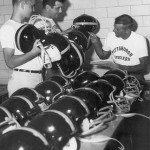How has God gifted you by his Spirit? (Part 2)
In my previous post (“How has God gifted you by his Spirit? (Part 1)“), I suggested that God empowers and equips his people by his Holy Spirit in many different ways. At times and for some people, God may choose to work primarily in one way – a way that may be considered that person’s “spiritual gift.” However, as we see in several examples in Scripture, God works through different people in different ways at different times and in different situations – i.e., different spiritual gifts.
When considering spiritual gifts, there is a danger. That danger is fixating on a specific spiritual gift. This kind of fixation (even with good intentions) can hinder the work that God desires to do through someone, and it can affect the relationships between God’s children.
First, fixating on a specific gift can hinder the work that God desire to do through someone because that person may not expect God to work through them in a certain way. Why? Because the person assumes that God will only work through them within that “spiritual gift.”
For example, consider a person that is “gifted” as a teacher. At times, God may choose to work through that same person to serve others or to prophesy or to work miracles. But, if the “teacher” only expects God to use her to teach others, then she may not follow what God is telling her to do. She’s not disobeying God because she desires to disobey; she’s disobeying because she has fixated on her particular spiritual gift.
Second, fixating on a specific gift can hinder relationships with God’s people. The person “gifted” as a servant not only loves to serve, he also tends to assume that God wants everyone to serve in the same way that he serves. When his gift is his focus, then that gift becomes important for everyone.
Obviously, when this happens, friction and discord build among God’s people. Or, if the gifted person is also given a position of authority over others, the others tend to adjust their own service to match their leader’s “gifting.”
Just as God extends people’s hearts differently (see my post “How far does your heart extend?“), he gifts them and works through them differently in whatever realm he places them. This should be expected, both in our own life and in the lives of others.
These differences are meant to be both embraced and celebrated! We should rejoice when God directs someone to serve people in a different realm than us or in a different manner than us. This simply demonstrates the myriad grace of God.
Besides extending our hearts to people in different regions and gifting us in different ways, God also gives us all different opportunities and passions. I’ll examine these differences next…
How has God gifted you by his Spirit? (Part 1)
Yesterday, I asked the question, “How far does your heart extend?” With that question, I was asking where along the spectrum God has placed your loves and passions: from those nearby to those far away and across the globe. Neither extreme is better than the other.
In this post, I ask a similar, but someone different, question: How has God gifted you by his Spirit? This question refers to what is typically called “spiritual gifts.”
In Scripture, there are several different lists of spiritual gifts: Romans 12:6-8, 1 Corinthians 12:8-10, 1 Corinthians 12:27-30, 1 Corinthians 14:26, Ephesians 4:11, 1 Peter 4:10-11 (my personal favorite). While many suggest that Ephesians 4:11 is a special (and exhaustive) list, I do not think any of these lists are intended to be exhaustive.
In fact, in many ways, it’s impossible to know exactly which spiritual gift someone may or may not have or which spiritual gift someone may or may not be exercising. (And, yes, for the record, I think that “spiritual gift inventory” tests are pretty useless.) Of course, we can observe how God chooses to work through us and others. But, even that may not tell us everything.
Consider Paul. In the Book of Acts and in his letters, we see Paul working as an apostle, prophet, evangelist, shepherd, teacher, servant, encourager, giver, leader, tongues speaker, healer, helper, discerner, etc. So, what spiritual gift did Paul have?
Now, some might suggest that Paul was a super-Christian, but his co-worker Barnabas is described in many of the same ways as Paul, and God worked through Barnabas in many of the same ways listed above. The same could be said of other people in the New Testament, although we have less information about them.
This does not negate that fact that some people in the New Testament were known for one specific type of “gift.” For example, Philip was known as an evangelist while his daughters were known as prophets. (Acts 21:8-9)
So, as we’re thinking about how God has gifted us by his Spirit, we can begin by understanding that the “gifts” listed in Scripture may not be “hard and fast” or easily distinguished. Also, it’s possible that God can work through people in different ways at different times and in different locations and situations. At the same time, it’s also possible that God can choose to work through someone in a specific way primarily.
In Part 2, I’ll look at one of the dangers of considering how God has gifted us by his Spirit.
Five-Fold Ministry? Seven-Fold Ministry? Eight-Fold Ministry? Why not All-Fold Ministry?
Keith at “subversive1” has written on a topic that (I think) is often misunderstood. His post is called “58 Fold Ministry?” and it tackles the subject of the (so-called) five-fold ministry in Ephesians 4:11.
He examines the list of spiritual gifts (and spiritually gifted people) in Ephesians 4:11, but he also compares that list to the ones in Romans 12:4-8 and 1 Corinthians 12:28. (Of course, there are others lists in 1 Corinthians 12:8-10 and – my personal favorite – 1 Peter 4:10-11.) And, he asks a very good question: Why are the spiritual gifts in Ephesians 4:11 considered the “five main gifts in the church today, or that these five should be exalted above all the other gifts…”?
Keith decides that there are at least 58 gifts listed in various places in the New Testament, and the each of these (and any others) are necessary for the growth and vitality of the church. (Sounds similar to what Paul says in the entire section of Ephesians 4:7-16.)
I love Keith’s conclusion:
At face value, the message of the New Testament is that you matter. Your gift – whatever it is – is necessary. You are important. You have something the rest of us need. We have something that you need. We need one another to grow and to thrive.
As Paul says in each of these passages, there are many gifts, and they are all given by the One Spirit, and we are all members of each other. Our gifts are not for us, they are not about us, they are about one another and the purpose of these gifts is to be a blessing to everyone else and to exalt them, not ourselves.
So, I’m not sure about you, but since there are something like 58 different spiritual gifts mentioned in the Bible, I’m a big fan of the Fifty-Eight Fold Ministry of God.
Please take the time to read the rest of Keith’s post! It’s worth the read.
So, are those gifted as apostles, prophets, evangelists, and shepherds and teachers important for the edification of the church today? Absolutely! But so are those who are gifted as servants, helpers, administrators, etc. etc. etc.
If you are in Christ, then he desires to work through you to build up his church.
Using Spirit Gifts as an Excuse or a License
When I was growing up, I was given a spiritual gifts test. I didn’t study for it, but I aced. I got the best gifts. How did I know they were the best? Because they were exactly the things that I cared most about.
Then, I was told how to use those gifts to volunteer in the various church programs. I thanked God that day that “Nursery” did not show up in my list of possible jobs. But, unfortunately, I was actually too young to do anything that was on the list. So, I could look forward to the day when I grew up and I could finally use my spiritual gifts.
Someone told me about an opportunity to serve someone, but I informed that person that service was not my spiritual gift. I encouraged him to ask someone with the more appropriate spiritual gift. Service was not my responsibility.
There was another opportunity to help someone with administration. No. Trust me. I am not gifted in administration. Someone with that spiritual gift should handle that problem.
Meanwhile, I would wait for an opportunity to teach. I mean, I was gifted by the Holy Spirit of God in teaching, so that’s what I was going to do. Eventually. One day. I mean, when I got older.
Oh, but then an opportunity presented itself! It wasn’t like an official position in the church; not even a small group or Bible study leader. But, there was someone who needed teaching. It was obvious this person needed teaching, and I was a teacher. So I jumped in and pointed out where this person was wrong, and I set them straight. I was teaching. It was so exciting. (That person didn’t talk to me much after that though…)
Sure, the examples above are hyperbolic, and exaggerated, and fiction (sort of). But, they demonstrate the way that I typically hear people explain spiritual gifts. When someone has a certain spiritual gift, they then have a license to function in that way, and an excuse not to function in any other ways.
But, when I read Scripture, that’s not the distinction that I read. Yes, people have one or more spiritual gifts. And, of course, people who are gifted in a certain way should function in that way – in love, for the purpose of building up others, and under the direction of the Holy Spirit. But, guess what? According to the authors of Scripture, that same person should also function in other ways as well.
I mean, we know this about the “lesser” spiritual gifts like service, helps, encouragement, giving, etc. We may even add evangelism to that list of spiritual gifts that all followers of Jesus are responsible (and privileged) to do.
But, what about teaching? No. Leave that for the teachers. Prophecy? That’s just for the prophets. Pastoring? Of course, only the pastors are supposed to pastor (shepherd).
But, what if we actually thought that God could use us to do any of those things… even if we are not specifically “gifted” in that way?
I think we would see a different church… one that’s closer to what we read about in Scripture… a church that would be more focused on what God could do through us for the sake of others instead of focused on what we can do.
Replay: Spiritual gifts and the gathered church
Five years ago, I wrote a post called “Spiritual Gifts and the Gathered Church.” God gifts all his children in ways that he can work through them to build up others. Think about that a moment: “to build up others.” That assumes that God’s children are given opportunities to speak to and serve others when they are gathered together.
It seems simple and straightforward, but it’s a “radical” idea among the church today. I think that’s very unfortunate, and I think that the church is hindered in their growth because of it.
————————————
“Spiritual Gifts and the Gathered Church”
One of the most interesting books that I have read in the last few years is Paul’s Idea of Community (Peabody, MA: Hendrickson Publishers, 1994) by Robert Banks. In one part of this book, Banks discusses the purpose of Spiritual gifts for believers, especially when believers are gathered together:
We have seen how gifts were distributed to every member of the community by the Spirit and that through their mutual sharing these were exercised amongst them. Guidance on matters affecting the community’s life was principally granted to members when they met together to discern what God required of them. They received this guidance from the Spirit through their exercise of gifts of knowledge, revelation, wisdom, and so on. In all this Paul never tires of insisting that every member of the community has the responsibility to impart the particular insights they have been given…
Thus, the most characteristic setting in which the community received guidance was when Christians assembled to share and evaluate the gifts given to them. Here, in a variety of complementary ways, the guidance was conveyed through each to all and through all to each.
Both nurture and discipline within the congregation, then, should arise spontaneously from the concern of every member for the quality of its life and the involvement of every member in decisions affecting the whole. (137-138)
Banks describes exactly what Paul writes about in 1 Cor. 12:7: Spiritual gifts are given for the benefit of others, not for our own benefit. Perhaps, Acts 13 includes the best biblical example of the Spirit communicating to the community through the gifts of those within the community:
Now there were in the church at Antioch prophets and teachers, Barnabas, Simeon who was called Niger, Lucius of Cyrene, Manaen a member of the court of Herod the tetrarch, and Saul. While they were worshiping the Lord and fasting, the Holy Spirit said, “Set apart for me Barnabas and Saul for the work to which I have called them.” Then after fasting and praying they laid their hands on them and sent them off. So, being sent out by the Holy Spirit, they went down to Seleucia, and from there they sailed to Cyprus. (Acts 13:1-4 ESV)
Notice that it was in the context of exercising spiritual gifts (i.e. to the benefit of other people – 1 Cor. 12:7) that the men were serving the Lord. (Now, I know that the ESV says the men were “worshiping”, but the word is probably better translated “serving”.) While they were serving people and the Lord, the Spirit communicated both to the men being sent, and also to the church. The men listened, and the church listened. The Spirit spoke. The people responded. Interesting, this passage says that both the church “sent” the men and that also the Spirit “sent” the men.
Scripture only gives two requirements for someone to exercise their gift when the church is assembled: whatever they do must be motivated by love (1 Cor. 13) and must edify the church (1 Cor. 14:26). No gifts should be refused, and no gifts should be elevated above the others – as long as the gifts are used to edify other people. Similarly, the people should be given the opportunity to use their gifts when the church is assembled, and they should be reminded that God holds them responsible for this. In other words, if someone is in charge of the meeting time, that person should make sure that others are given opportunity to edify the church. And, the people gathered should be reminded that God wants them to participate and expects them to participate in building up the body.
Do you expect God to communicate to you through the Spiritual gifts of the entire body, or just through the gifts of a few leaders within the body? Do you expect God to communicate to the church through the Spiritual gifts that he gives you? Are you obedient to God in building up his church and allowing others (with different gifts perhaps) to have the same opportunity?
Trickle down effect doesn’t work among the church?
If you follow me on Facebook or Twitter, then you know that I link to several older posts each day. I’m encouraged when someone responds to these old posts or thanks me for them. I sometimes struggle with when to continue discussion on those old posts and when to let new comments stand.
Anyway, Arthur at “The Voice of One Crying Out in Suburbia” recently picked up on one of my older posts and used it as a jumping off point for his own new post “Ephesians 4:11. It is not all about you.”
As you might guess, Arthur’s post is about Ephesians 4:11, and the gifted individuals listed there: apostles, prophets, evangelists, and pastors and teachers.
This is part of what he says:
Focusing on just the “specially gifted” in the church with faith in a theological “trickle down effect” has proven catastrophic for centuries… Every person in the church has something to contribute and teach to others in the church, not just a few at “the top”…
[W]hen Ephesians 4:11 is read in context it is not about pastors or “leaders” at all. It is about the entire church, working together and edifying one another, becoming mature together.
Ah, yes, it does make a difference when we read Ephesians 4:11 in context, especially with Ephesians 4:16 – part of the same sentence.
Nope, the “trickle down” effect is not the way the God works through the church.
But, in one sense, Ephesians 4:11 IS about you. It is about how God has given YOU to the church so that he can work through YOU to build up his church and to help others carry out works of service.
What a difference it makes among the church and in the world when “each part is working properly”…
It’s not just about prophecy and tongues
At some point in the history of the believers in the Corinth, they (some of them anyway) apparently wrote a letter to Paul. He had traveled to Corinth (a major city east of Athens) earlier and had spent almost two years proclaiming the gospel and strengthening those who received the message.
Eventually, after Paul left on his continuing journey, some troubles and questions arose among the Corinthian believers. In response to their questions, Paul wrote a letter back to them. One of the questions that Paul answered concerned spiritual gifts (1 Corinthians 12-14).
He begins by reminding the Corinthians that only God could give them gifts, and he did so according to his own grace and desires. All spiritual gifts (and, thus, all believers) are necessary and important – especially those that may seem less important. (1 Corinthians 12)
Next, Paul tells the Corinthians that any spiritual gift (even the greatest) was worthless if the person did not love others. He said that eventually all spiritual gifts would cease (would no longer be necessary), but love would never cease. (1 Corinthians 13)
Within these two sections, Paul lists several different types and forms of spiritual gifts, all of them given by God for the benefit of others. While he says that different people are given different gifts for different reasons, he does not actually differentiate among the gifts (i.e., he does not call some “sign gifts” or “miraculous” gifts). To Paul, all of the gifts of the Spirit are “miraculous” because they are given from God through people.
In the last part of his answer to their question about spiritual gifts (1 Corinthians 14), Paul focuses on two of the spiritual gifts that he had already mentioned: prophecy and tongues. To Paul, there is one major difference between these two gifts: prophecy is directly understandable by people while tongues must be interpreted otherwise it is not understandable. In fact, Paul gives several examples, illustrations, and exhortations that prophecy is more beneficial when the church is gathered together specifically because people can understand it.
If we understand this major point in Paul’s argument, we can see that Paul is not only talking about prophecy and speaking in tongues. He’s using prophecy as an example of something that is understandable to all, and he’s using tongues as an example of something that is not directly understandable. (Of course, if the tongues is interpreted, then it becomes understandable.)
In this way, we can see that the end of Paul’s instructions (1 Corinthians 14:26-40) can help us understand other types of speaking and/or serving when the church is gathered together. Is the activity/speaking directly understandable to those gathered? If so, then it would fall under the guidelines that Paul gives for prophecy. If the activity/speaking is not directly understandable, then it would fall under the guidelines that Paul gives for speaking in tongues.
Teaching, praying, singing, etc. (if done in a way that others can understand) should be by two or three (one at a time) then the other would judge/discern what was said/sung/etc. If these things are done in a way that others can’t understand, then they should only be done by two or three (one at a time) if someone can interpret. (Of course, the interpretation would then follow the guidelines for prophecy, including being judged/discerned.)
It’s clear from the entire passage (1 Corinthians 12-14), that Paul is not ONLY concerned about prophecy and tongues. If we carry this broad concern into 1 Corinthians 14, then we can see that Paul’s guidelines are not only for prophecy and tongues.
When equippers don’t equip
Recently, I had a very interesting conversation with a friend on Ephesians 4 – specifically Ephesians 4:11-12 – “And he [Jesus Christ] gave the apostles, the prophets, the evangelists, the shepherds and teachers, to equip the saints for the work of ministry, for building up the body of Christ…” (Ephesians 4:11-12 ESV)
While I’ve written several posts about the list in Ephesians 4:11. For example, one of my most read posts of all time deals with whether Paul intended to list four or five different types of gifted individuals in the list. Also, I’ve written posts about whether this post in simply a sample of gifted individuals (like all of the other spiritual gift lists) or whether this list in exhaustive.
But, in this post, I want to focus on something else: the purpose of the spiritually gifted individuals listed in Ephesians 4:11. Paul tells us why Jesus Christ gives spiritual gifted individuals to the church in verse 12: “…to equip the saints for the work of ministry, for building up the body of Christ…” (Ephesians 4:12 ESV)
Thus, the work of the apostle, prophet, evangelist, and shepherd-teacher includes equipping (preparing) the church for works of service. While these gifted individuals will naturally work within their giftings, they are also supposed to equip the saints to carry out those same functions.
This is best seen in the spiritually gifted evangelist. From the name “evangelist,” it seems clear that this individually is somehow spiritually gifted to proclaim the gospel of Jesus Christ. But, evangelism is not “equipping the saints for the work of service.” The evangelist does not carry out this function until he or she is almost helping other believers to proclaim the gospel of Jesus Christ.
The evangelist, then, is not carrying out the evangelist’s function ONLY by sharing the gospel. Instead, the work of the evangelist includes teaching and showing others how to share the gospel.
Now, take this same idea into the realm of the apostle, prophet, and shepherd/teacher. Again, these individuals should function within the realm of their particular gifting (by being sent, prophesying, or caring/teaching), but their functions do not end there. They are also to help others understand and live as being sent, to help others listen to God and prophesy, and to help others care and teach.
An apostle who is always going but is never helping others to go is not doing the work of an apostle. A prophet who is always prophesying but is never helping others to prophesy is not doing the work of a prophet. An evangelist who is always sharing the gospel but is never helping others to share the gospel is not doing the work of an evangelist. A shepherd/teacher who is always caring/teaching but it never helping others care/teach is not doing the work of a shepherd/teacher.
The spiritually gifted individuals listed in Ephesians 4:11 are given to the church both to function within their own giftings AND to help others function within those giftings as well. (I would argue this is true for other spiritual gifts also.)
So, how can we tell if we are equipping others? Well, we could start by asking if we are always doing the work that we are gifted at doing, or are we showing others how and giving them opportunities to do the same work.
By the way, if we continue reading in this same passage, we see why it is so important for these individuals to equip the church to do works of service. In Ephesians 4:16, Paul says that the church grows only when the whole church is working together. The church does not grow when only those listed in Ephesians 4:11 are working.
It’s time for equippers to stop doing all the work and start equipping others to work. This means that at times the equippers needs to step out of the way so others can function as God has gifted and prepared them. (If we never feel others are ready, it’s because WE are not equipping them.)
Will all the pastor-teachers please stand up?
Will all the pastor-teacher please stand up? Now everyone else, take a seat and listen.
Miguel at “God-Directed Deviations” continues to write very good posts concerning the church and Scripture. His latest post is called “Pastor-Teacher, The Odd Couple?”
In this post, Miguel is asking about the gift of “pastoring-teaching” as listed among the other gifted individuals in Ephesians 4:11.
His post, mainly questions, is centered around the following very important question: “If you necessarily connect the Ephesians 4 giftings of Pastor and teacher then aren’t you assuming that one who shepherds can also teach and vice versa?”
I think that grammatically Paul connects the gift of sherpherding and the gift of teaching in that verse, but I do not think that he was equating the two. Of course, as one commenter has already pointed out, the primary problem today is not the way Paul connects or does not connect shepherding and teaching, but the way the giftings are then associated with “offices” and authority within the church.
So, what do you think? What is the relationship between the gift of shepherding and the gift of pastoring in Ephesians 4:11 and among the church?
Comment Highlight: Ephesians 4:11 list as characteristic gifts
I’m late getting this comment highlight up, but I really appreciated it, so I want to publish it here and give it more visibility.
The comment was left by Miguel on an old post called “And he gave… (Ephesians 4:11)”
Here is Miguel’s comment:
I do not believe that Paul could have used any words in Ephesians 4:11, but only the words that were used. That said, I do believe that all believers are gifted with the characteristic ministry aspect of each of the gifts listed there. I think the other giftings in the other passages you cited are sub gifts of the ones listed in Ephesians 4.
Our primary concern in the region where we work on South America has always been whether or not the Ephesians 4 giftings are for the Church today. When I look at the greek, and find that “And He Gave,” is the Aorist Active Indicative and that it is classified as a “culminative or effective aorist,” it would seem, on the surface that those gifts “were” given at one point in time for the purpose of laying foundation and then, at some point in the future would no longer be given.
Perhaps some of my greek geek friends can correct my thinking here. Regardless, because word studies can often yield faulty conclusions, I do believe that the ministry gifts are not only still being given, but still very active.
What are your thoughts?









